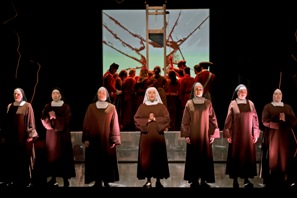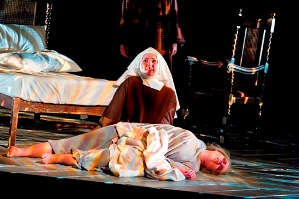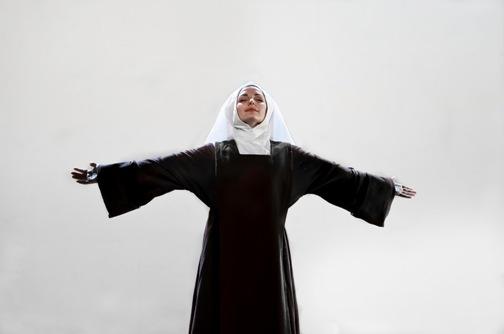Let's begin at the end. Isn't the nuns-to-the-scaffold scene which concludes Poulenc's ultimate testament of doubt and faith the deepest, most heart-wrenching finale in all opera? It even has the edge over Richard Strauss's Rosenkavalier trio and duet, in that the singers often end up in tears as well as the audience. If my eyes were dry at the end of the Guildhall School's valiant staging, that's not because the production lacked the necessary clarity, imagination and motion, nor was it due to any dearth of good voices. But clearly something wasn't quite right.
Perhaps it was a question of space, both visual and aural. The musical space I'd regard as the cumulative inward glow of this often very meditative and outwardly uneventful score. Clive Timms admirably gave more than the usual momentum to propel us through the initial crisis in the de la Force household, April 1789, which eventually sends the unstable Blanche off to the Carmelite convent at Compiègne. Then the score needs to settle, to intimate what the spiritual life of the nuns is all about, between the upheavals, the doubts and the crisis; more orchestral introspection is needed than we get here.
The libretto, adapted from George Bernanos's play - which I'd quite like to see done straight - has its eloquent moments, though not perhaps enough to persuade an outsider of the religious options during a time of trouble in the way that, for me, Xavier Beauvois's masterpiece of a movie Of Gods and Men so movingly achieves (both film and opera deal with the rights and wrongs of martyrdoms, of how to stay true to oneself in the face of death). So persuasive faith is left to the halos of strings, the piercingly beautiful woodwind solos, none of which functioned at their best last night in the rather dead zone of the Guildhall Theatre. Trumpets and horns, too, were proving intractable in the conflict music on the first night, though maybe they'll settle over the next four performances.
Vocal quality was there from the start. Anna Patalong commands the lyric and neurotic impulses of fear-stricken Blanche with even tone throughout the range, though the lower register needs a little more power and the upper more reining in; something of the focus I fancied I heard when I first encountered this so obviously gifted soprano, in George Crumb's Ancient Voices of Children at the Barbican just over a year ago, seems to have been lost. But her envious outbursts against the loveable Sister Constance - a bright, clear performance from Sophie Junker - make their mark, and Blanche's abject self-hatred when she flees the vow of martyrdom and hides in her dead father's Paris home duly unsettles.
 Director Stephen Barlow pulls out the ultimate stops as Blanche rejoins the sisterhood on the scaffold as the last of the martyrs. The image of the shattered carriage window which launches and dominates the work, variously lit as burning coals and spider's web, slides back and a self-respecting soul is left alone in light, arms raised. I can see the point, but that's my other question mark about space, this time the inner state of grace made visible - it really needs to be there for the whole of the "Salve Regina" sung by the sisterhood (pictured right) as, one by one, they succumb to the fall of the blade (the sound of which, incidentally, was not as shocking as it can be). Barlow echoes, up to a point, the unforgettable symbolic gestures of Robert Carsen's peerless production: here the nuns let their prayer-clasped hands fall to their sides as they "die" at the front of the stage, while the guillotine and a not very convincing group of revolting peasants do their stuff, or rather some rather indecipherable kind of stuff, at the back. This would surely work better as open space for all the other women's liberation, too.
Director Stephen Barlow pulls out the ultimate stops as Blanche rejoins the sisterhood on the scaffold as the last of the martyrs. The image of the shattered carriage window which launches and dominates the work, variously lit as burning coals and spider's web, slides back and a self-respecting soul is left alone in light, arms raised. I can see the point, but that's my other question mark about space, this time the inner state of grace made visible - it really needs to be there for the whole of the "Salve Regina" sung by the sisterhood (pictured right) as, one by one, they succumb to the fall of the blade (the sound of which, incidentally, was not as shocking as it can be). Barlow echoes, up to a point, the unforgettable symbolic gestures of Robert Carsen's peerless production: here the nuns let their prayer-clasped hands fall to their sides as they "die" at the front of the stage, while the guillotine and a not very convincing group of revolting peasants do their stuff, or rather some rather indecipherable kind of stuff, at the back. This would surely work better as open space for all the other women's liberation, too.
Otherwise, atmospheric use is made of a revolving oblong space for the shelter of both the de la Forces' Paris house and the convent, sparsely but imaginatively furnished in David Farley's economical designs and well lit by Declan Randall - though the singers' faces are sometimes in shadow. Intimacy is this production's great virtue over the vast spaces filled in ENO and La Scala productions (I'm assuming the opera has never been staged at Glyndebourne, which would be the perfect house for it). Still, putting a wimple on a woman makes visages difficult to tell apart at any distance, so you're glad the libretto has the characters address each other by name as often as it does, and the casting's great strength is that all the voices sound different - even when not attractive, or difficult to imagine in future roles, like Sylvie Bedouelle's Mother Marie and Sky Ingram's Madame Lidoine. But both are clearly delineated dramatically - you don't doubt the new prioress's strength or purpose, or her less flexible opponent's late moment of grace when she realises her future is not on the scaffold. The men are less good with the French but generally dependable if not as individual.
 Dodgy techniques in some of the smaller roles make me wonder, as I always have on visits to the Guildhall, exactly what's being taught on a practical level. But this production has a higher quotient of promising talent than any other I've seen here, and to match Patalong's assurance there's another voice of distinction in the very mature sounding Cátia Moreso, heading in a direction somewhere between the cut of Felicity Palmer and Regina Resnik. The death in agony and doubt of her imposing, if occasionally slightly over-ferocious Madame de Croissy (pictured above left with Patalong as Blanche) is another highlight in an evening that's never less than engaging. Just don't go expecting it to be overwhelmingly moving and you may get more out of it than you expected.
Dodgy techniques in some of the smaller roles make me wonder, as I always have on visits to the Guildhall, exactly what's being taught on a practical level. But this production has a higher quotient of promising talent than any other I've seen here, and to match Patalong's assurance there's another voice of distinction in the very mature sounding Cátia Moreso, heading in a direction somewhere between the cut of Felicity Palmer and Regina Resnik. The death in agony and doubt of her imposing, if occasionally slightly over-ferocious Madame de Croissy (pictured above left with Patalong as Blanche) is another highlight in an evening that's never less than engaging. Just don't go expecting it to be overwhelmingly moving and you may get more out of it than you expected.
- Four more performances of Dialogues des Carmélites at the GSMD. Natalya Romaniw sings the role of Blanche on 5 and 9 March
Watch the finale scene of Dialogues des Carmélites in Robert Carsen's production from the Teatro all Scala, Milan















Add comment